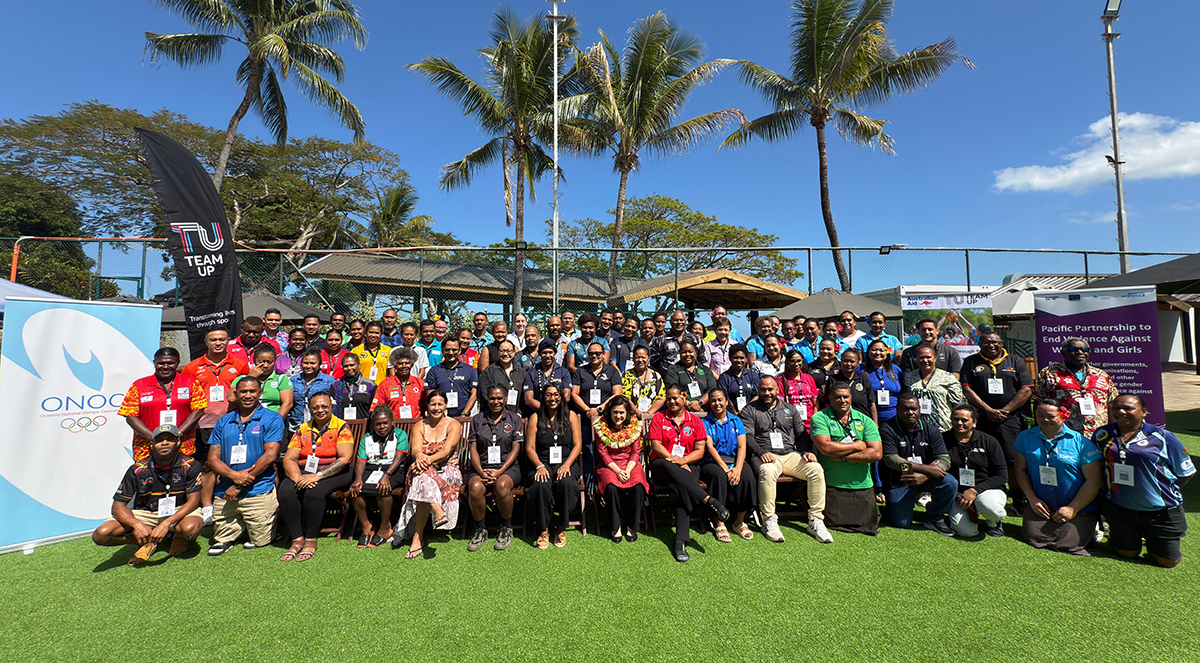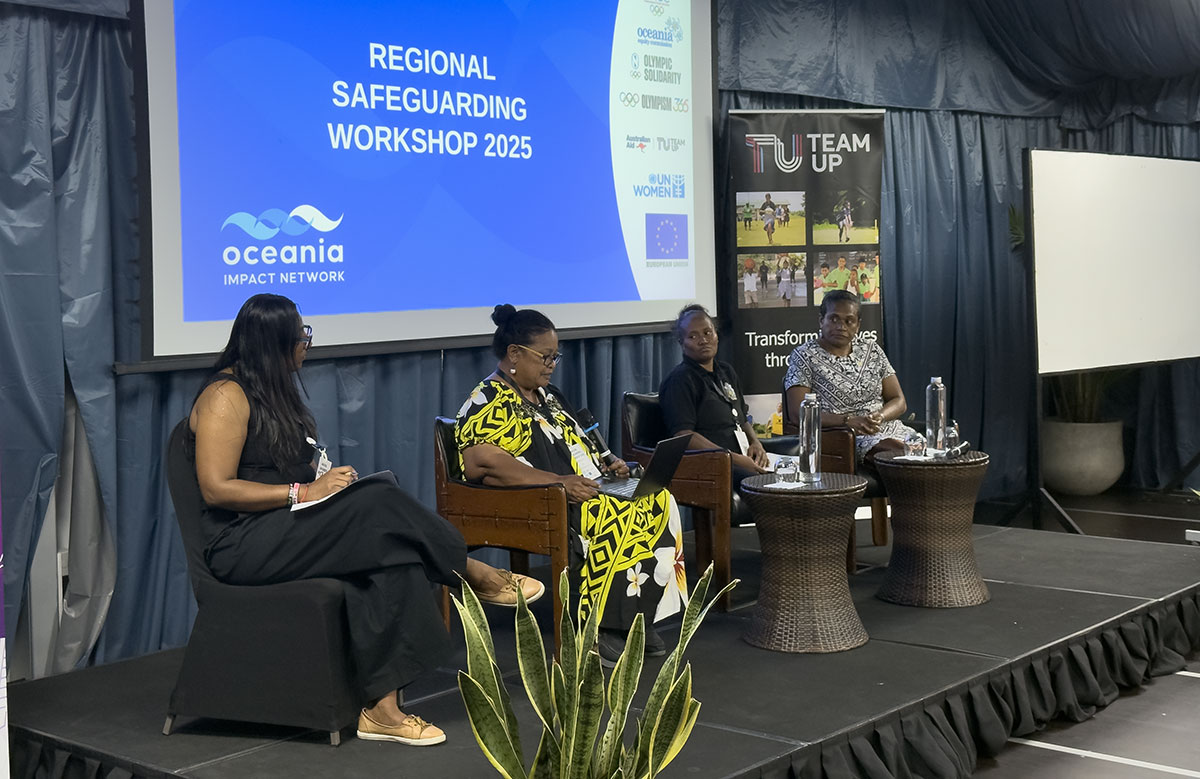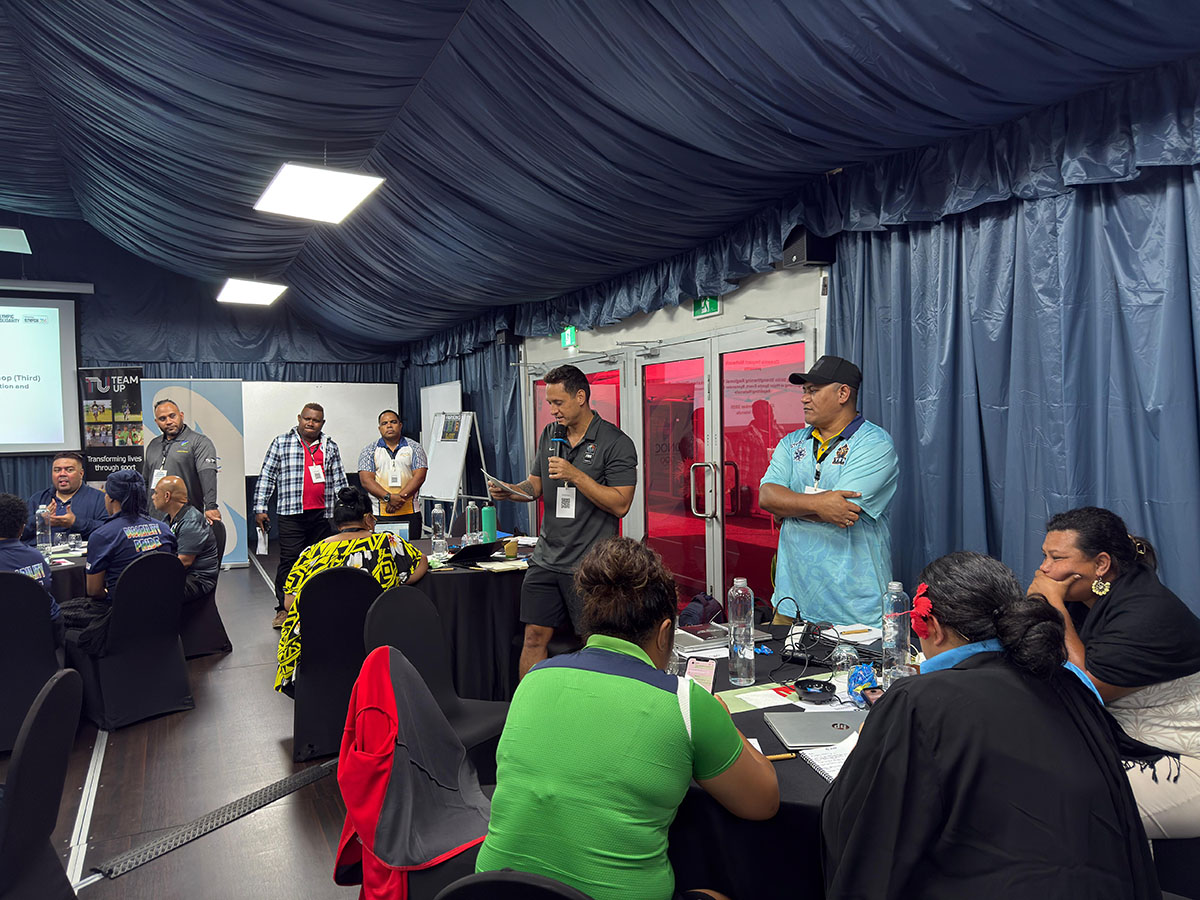Website Guide HERE

X

The Pacific region has taken another significant step in advancing safer and more inclusive sport with the opening of the Third Regional Safeguarding Workshop, delivered through the Oceania Impact Network (Oceania Impact Network) from the 23-25 September.
Joint Release - Bringing together more than 80 participants from 11 countries; representing service providers, diverse sporting bodies and government agencies.
The opening ceremony brought together distinguished guests, including Kate Coffey, Director of Pacific Sports Section, for the Australian Department of Foreign Affairs and Trade (DFAT); Alison Davidian, The Representative of UN Women Fiji Multi-Country Office; and Liz Dawson, Chair of the Oceania National Olympic Committee (ONOC) Equity Commission.
Speaking at the opening, representatives from partner organisations stressed the importance of not only strengthening technical safeguarding skills but also deepening connections between safeguarding focal points and gender-based violence service providers. This integrated approach, reflected in the workshop’s diverse participants, from Team Up program partners and National Olympic Committees to front-line service providers; this underscores the Pacific’s commitment to ensuring robust, inclusive, survivor centered, and rights based safeguarding systems.
Kate Coffey, Pacific Sports Section Director at DFAT highlighted the transformative role of sport in social change, “Individually and collectively, we share a strong commitment to see an empowered, inclusive and safe sport ecosystem that contributes to a Pacific region free from violence and discrimination. A big part of that is also the focus of this workshop – safeguarding. It is about ensuring that across the Pacific, everyone involved in sport and especially those most vulnerable can enjoy sport that is safe and free from harm. And it’s genuinely empowering to see the dedicated focus on safeguarding and the prevention of violence amongst OIN partners.”

Liz Dawson, Chair of the ONOC Equity Commission, reiterated the Olympic Movement’s commitment to safeguarding saying, “Safeguarding isn’t just a policy, it’s a responsibility. Every athlete, every coach and every young person in the Pacific deserves to take part in sport free from harm, free from abuse and discrimination. This workshop is one step closer to making sport safer and more inclusive for all”
The workshop also reflects the shared commitment of UN Women, through the Pacific Partnership to End Violence Against Women and Girls (Pacific Partnership), to collaborate with sports partners in addressing violence and building safer communities. Alison Davidian, Representative of UN Women Fiji MCO said, “We know the statistics, two in three women in the Pacific experience violence in their lifetime. That’s not violence in sport alone. It’s violence in homes, in communities, in workplaces. But sport is not separate from those spaces. Sport reflects our societies, and it can either reinforce harmful behaviors, or it can be the place where we start to change them.”
This third regional workshop builds on the momentum of earlier safeguarding initiatives, and the focus was on designing different components of safeguarding strategies at major sport events using the Team Up draft safeguarding toolkit. Additionally, bystander intervention strategies were discussed and role played, including deepening knowledge and application of trauma informed approach in sports and safeguarding measures for technology facilitated violence in sports. The partnership between sport organisations, disability people’s organisations, service providers and relevant government agencies continue to be strengthened and this year we had government representatives from Solomon Islands, Nauru and Fiji to share on mandatory reporting and referrals. The participants were also introduced to four monitoring, evaluation and learning tools to measure the impact and progress of their safeguarding work.
This workshop comes at a crucial time as Pacific athletes and organisations prepare for major regional and international competitions. By strengthening capacity and driving cross-sector collaboration, the Oceania Impact Network is setting the stage for a safer, more inclusive sporting ecosystem. This workshop is a pivotal step toward gender equality and safeguarding in sport which lays the groundwork for a stronger, brighter future for sport across the Pacific.
Marjorie Karl, Counselor, Ewak n Erateko (Safe house- Nauru) a service provider reflecting on the workshop stated, Service providers aren’t extras; they’re essential to safeguarding. Their presence ensures safe handling of disclosures, protects confidentiality, and prevents long-term strain on both sports and national systems. We must continue to build awareness of the realities of violence against women and girls and equip safeguarding officers to treat the issue with the seriousness it deserves. “

Reflecting on the impact of the Workshop, Sela Niukapu, Program Manager, Smash Down Barriers, Tonga Table tennis Federation said “ I recently started working in Smash Down Barriers program and the safeguarding training has helped me realise that safeguarding is a priority and not just reactive, and I feel prepared and motivated to keep sports safe for everyone. The workshop helped me build more awareness on disability and the safety of athletes. Safeguarding is about ensuring that everyone in sport feels safe, protected and valued. This workshop has helped shape me into a better person and has given me the confidence to handle safeguarding situations”
Roshika Deo, GEDSI and Safeguarding Advisor at Team Up and the lead facilitator for the regional safeguarding workshops shared, “This workshop built on content from the last two regional workshops and the online community of practice sessions. It has been great to see the increase in capacity and skills of some individuals over the years where they are now holding regular safeguarding awareness sessions in their organisations and communities, including developing various safeguarding policies and protocols. We have seen sports publicising their safeguarding reporting systems, creating safeguarding awareness posters and initiating important discussions in their organisations on the composition and need for case management teams. These all reflect the safeguarding journey many of the participants have been for the last four years. We are also pleased to note the greater engagement with service providers. All of this is culminating into sport organisations incorporating safeguarding measures at major sport events whether it is national competitions or regional and international tournaments. The leadership shown by the participants over the years is inspiring and shifting cultural and gender norms in sports.”
The Oceania Impact Network is a collective of committed stakeholders who share a common vision of promoting gender equality, inclusion, and safety in and through sports in the Pacific. It was initiated by the Oceania National Olympic Committees (ONOC), through its Equity Commission; the Australian Government’s sport for development program Team Up; with UN Women, through the Pacific Partnership to End Violence Against Women and Girls (Pacific Partnership) funded primarily by the Government of Australia, and the European Union; and the International Olympic Committee (IOC) through Olympism365 and Olympic Solidarity.
For media inquiries and additional information, please contact:
Andrew Lepani
Communications Specialist – Team Up
Email: aaron.ballekom@ghd.com
Ala-Cassandra Singh
Co-Ordinator – Oceania Impact Network (OIN) ONOC
Email: alacassandra@oceanianoc.org
Shazia Usman
Communications and Media Specialist – UN Women Fiji Multi-Country Office
Email: shazia.usman@unwomen.org
###
About ONOC
Established in 1981, the Oceania National Olympic Committees (ONOC) is one of five Continental Associations. It looks after the interests of 17 member nations in the Oceania Region, including Australia and New Zealand as well as seven associate members.
###
For more information, please contact;
Sitiveni Tawakevou
Chief Communications Officer (Acting)
sitiveni@oceanianoc.org
###
Digital Channels
For up-to-the-minute information on ONOC and regular updates, please follow us on Facebook, Twitter, Instagram LinkedIn and YouTube.